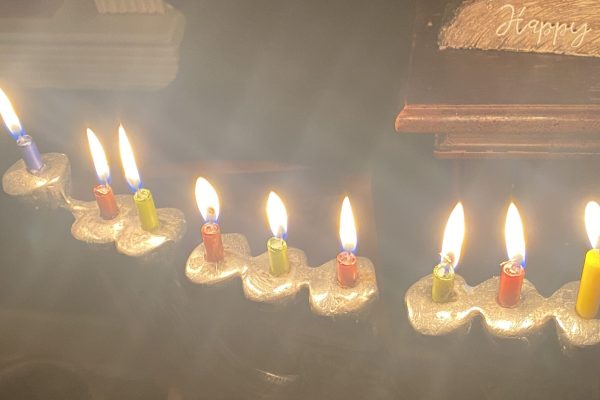Ahhh, yes. The December Dilemma. My wife Bonnie and I started talking about how to handle it while we were still engaged. We suddenly had realized that yes, one day we would have children. What to do? We had no clue. We just knew that it was better to go into family life with a game plan. We felt that if we waited to figure it out after our children were born, we would be susceptible to disaster.
Having already decided to raise the kids Jewish, like their mother, we knew they would celebrate Hanukkah, and I would help them celebrate their holiday. That was the easy part. But I am Protestant and still celebrate Christmas. I also wanted our children to learn about my holidays. In addition, Christmas would likely be spent with my parents and my siblings. My brother and sister are both married and would soon have kids as well. We are a close family and all live in the same town. We always get together for the holidays. How would my children react if they had to sit still and watch their cousins open a bunch of presents from Santa? And it’s not just the presents. There are a lot of feelings that run wild and free during the Christmas season. The spirit of the holidays is everywhere. There are trees to be decorated, cookies to bake, and lights to be strung. Santa’s jolly pink face is everywhere—even on your can of Coke. These are all fun things that I grew up with and was not about to give up (not that American marketing would let me). So we decided that Bonnie and the kids would also help me celebrate my holidays. We were not going to raise our kids in both religions. Sure, they were to learn about what Christmas means to me. But as Jews, they would only be assisting Daddy with his celebration.
Bonnie and I knew that whatever plan we came up with would have to be flexible. Not having children yet, we couldn’t possibly know what it would be like when they were born and reality hit us. We had to be able to make minor adjustments. The important thing was to make sure we were consistent. The main goal was to see that the kids knew they were Jewish and celebrated Hanukkah.
Four-and-a-half years ago, our first daughter, Gabby, was born. Last year, Molly came into our world. It was easy when Gabby was an infant. She didn’t ask questions. All we had to do was stick to our plan. But by the time Molly was born, Gabby started asking LOTS of questions.
“Who in our family is Jewish? Which grandparents are Christian? Does Daddy celebrate Hanukkah? Do I get Hanukkah AND Christmas presents? Will Santa bring me presents, even if I’m Jewish?”
We were afraid something like this would happen. We didn’t want our kids to focus on the differences in our family. Instead, Bonnie and I have tried to nurture a sense of identity for our children that they could be proud of, while realizing that their religion and culture are just part of who they are. They are a lot of things. They are girls, they have brown eyes, Gabby likes to dance, Molly likes to laugh at the dog, and, yes, they are Jewish. Daddy is tall, he has green eyes, and he is Christian. Mommy is pretty, she likes chocolate, and she is Jewish.
The next obstacle we had to overcome was keeping a consistent approach to the holidays. My Protestant parents kept asking us what kind of gift, if any, to give the girls on Christmas morning. Christmas or Hanukkah presents? We had to admit, we were slightly unprepared for the question. The gifts had never had an identifying label attached to them. But then again, the girls had never asked—until now. This is why we made our plan flexible. We knew we’d have to adapt to the unexpected.
After we discussed it for a few days, we finally decided how we’d explain things to our kids. Hanukkah was simple; the kids get Hanukkah presents. Christmas, which we celebrate at my parents’ house, was a little more complicated.
We decided to tell Gabby, “Santa brings you Hanukkah presents on Christmas, because he knows you’re Jewish.”
My parents and in-laws give the major gifts to our daughters on Hanukkah. Meanwhile, my parents save one or two smaller Hanukkah presents for Christmas morning. This seems to work well for us. The girls are consistently reinforced that they are Jewish, and they don’t miss out on activities during my holiday. (My parents, who love to give presents, don’t get denied on Christmas morning either.)
While working through this not-so-simple problem, both Bonnie and I had felt uncomfortable with various other solutions. Bonnie, in particular, often felt that it just wasn’t right to celebrate Christmas at all with the kids. However, I wanted to share with the girls some of the joy and special feelings that I had from my childhood. We both felt emotions that the other one couldn’t possibly know. Neither one of us, though, wanted to confuse our children. Fortunately, Bonnie’s step-mom offered us a refreshing bit of wisdom.
She said, “One day out of the year isn’t going to make or break their Jewish identity. It’s how you raise your kids as Jews the other 364 days that counts.”
In the end, we knew we were an interfaith family and would have to approach this from a different angle than same-faith marriages. We are both comfortable with what we’ve decided. It may not work for everyone, but it fits our family nicely. In the years to come, I’m sure we’ll have to face more surprises and twists. However, we have a sound foundation on which to build. We’ll be ready.
This article was originally published on Interfaithfamily.com.











